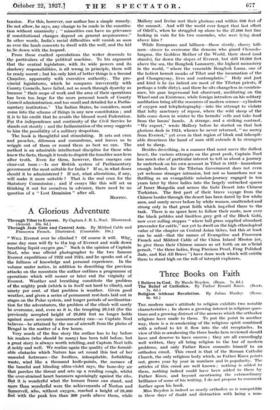A Glorious Adventure
Through Tibet to Everest. By Captain J. B. L. Noel. Illustrated. (Arnold. 1,0s. 64.) Through jade Gate and Central Asia. By Mildred Cable and Francesca French. Illustrated. (Constable. 10s.) "Wiu. Everest ever be climbed ? Of course it will. Why, some day man will fly to the .top of Everest and walk down breathing liquid oxygen gas." Such is the opinion of Captain Noel, who was official photographer to the two famous Everest,expeditions of 1922 and 1924, and he speaks out of a the fullness of knowledge. and personal experience. In the volume under notice, in addition to describing the previous attacks on the mountain the author outlines a programme of operations which will sooner or later, end the virginity of Everest. Weather and breathing constitute the problem of the mighty peak (which is in itself not hard to climb), and ninety per cent. of that problem is weather. Given good Weather, and given a series of permanent rest-huts, laid out in stages On the Polar system, and longer periods of acclimatiza- tion for the adventurers, the problem of the climb will surely be overcome, and, even as it is, the tempting 29,145 (for the previoUsly accepted height of 29,002 feet no longer holds against more accurate measurements) can—so Captain Noel believes—be 'attained by the use of aircraft from the plains of Bengal in the matter of a few hours.
Very much of the fine story the author has to lay before his readers (who should be many) has been told before, but a great story is always worth, retelling, and Captain Noel tells it nobly and well. We realize again the quality of the formid- able obstacles which Nature has set round this last of her unsealed fortresses-the Joodless, inhospitable, forbidding waste, wind like, a thousand knife-points, the menace of the baneful and, blinding ,ultra-violet rays, the bone-dry air that parches the throat and sets ,up a rending cough, whilst the over-strained heart hammers agonizingly against the ribs. But it is wonderful what the human frame can stand, and more than wonderful were, the, achievements of Norton. and 61:nervel1, who, without oxygen, reached a height of 28,400 feet with the peak less than 300 yards above them, while Mallory and Irvine met their glorious .end within 600 feet of the summit. And will the world ever forget that last effort of Odell's, when he struggled up alone to the 27,000 feet line looking in vain for his two comrades, who were lying. dead above him ?
While Europeans and hillmen—those sturdy, cheery hill- inen—strove to overcome the demons who guard 'Choino16- lungma, the Goddess Mother of the World, there stood land stands), far down the slopes of Everest, but still 16,000 feet above the sea, the Rongbuk Lamasery, the highest monastery in the world, "where the venerable Rengbuk Lama, one of the holiest hernia monks of Tibet and the incarnation of the god Chongraysay, lives and contemplates." Holy and just and kind is he (as indeed are most of the Tibetan' priests, if perhaps a trifle dirty), and there he sits Changeless in counten- ance, his gaze impersonal btit observant, meditating 'on the Wheel and on Existence, while foreign intruders on his solitary meditation bring all the resources of modern science—cylinders of oxygen and telephotography—into the attempt to violate that lofty sanctuary of repose, where the wild sheep of the hills come down in winter to the hermits' cells and take food from the lamas' hands. A strange, and a striking contrast'. "We expect," wrote Mallory before he started on that last glorious dash in 1924, whence he never returned, "no mercy from Everest," yet even in that region of bleak and inhospit- able dreariness the hand of man still extends it to strangers and to sheep.
Besides deecribing, in a manner that must move the dullest heart, the various attempts on the great peak, Captain Noel has much else of particular interest to tell us about a journey he undertook on his own account in Tibet in 1918—hazardous enough indeed, for the Tibetan Government does not even yet welcome stranger intrusion, but not so hazardous nor So thrilling as an evangelistic mission-journey engaged in ten years later by three ladies into the largely untracked spaces of Inner Mongolia and across the Gobi Desert into Chinese Turkistan. The first part of their brave voyage from the Chinese border through the desert has been dared by few white men, and surely never before by white women, unattended and strong only in that great faith which impelled them to the task. There is no space here to follow their route, now over the black pebbles and limitless grey grit of the Black Gobi; now over rolling steppes "where tall grass supplied abundant provender for cattle," nor yet to dwell on the high ethnological value of the chapter on Central Asian tribes, but this at least can be said—that the names of Evangeline and Francesca French and Mildred Cable of the China Inland Mission (or, to give them, their Chinese names as set forth on an official permit, "the three ladies, Feng Precious Pearl, Peng Polished Jade, and Kai All Brave ") have done work which will entitle them to stand high on the roll of intrepid explorers.


























































 Previous page
Previous page